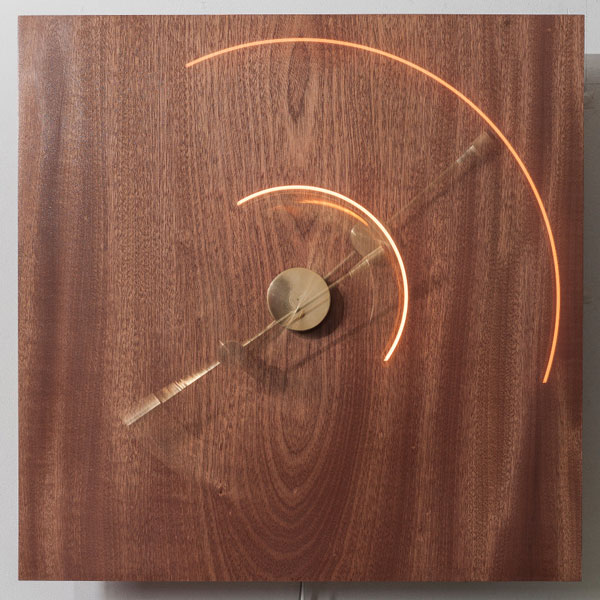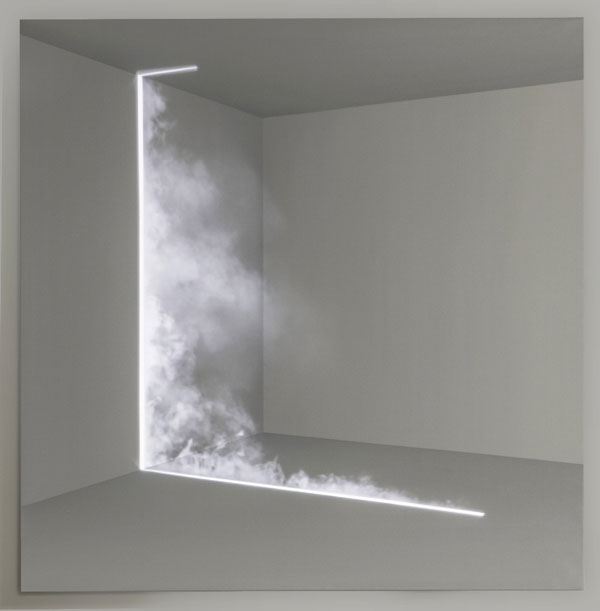PASCAL HAUDRESSY
Guest LAURENT BOLOGNINI
IN BETWEEN20.04.17 - 22.07.17
Opening 19.04.17, 6pm > 9pm
Irene Laub Gallery
8b rue de l'Abbaye
Brussels 1050
Belgium
www.irenelaubgallery.comART BRUSSELS 2017
Stand A04
Pascal Haudressy, Donato Piccolo,
Jonathan Sullam, Roeland Tweelinckx
20.04.17 > 23.04.17
GALLERY NIGHT à la Irène Laub Gallery
21.04.17, 18H > 21HÀ la lisière de la perception
De prime abord, deux grands formats carrés dont on ne sait trop s'il s'agit de peinture abstraite ou de photographie. On y voit des plans, des volumes et des perspectives. Un jeu subtil de nuances de blancs et de gris font songer à un espace probablement fictif, comme ont pu en concevoir des photographes, mais aussi des peintres, qui seraient partis d'une maquette avant de l'agrandir.
La photographie tiendrait plutôt la corde car, petit à petit on se rend compte que l'image fait office d'écran pour une projection qui vient non pas s'y superposer, mais s'y intégrer totalement. Un décor - écran, comme réceptacle d'une projection qui s'y confond. Est-ce pour autant une installation vidéo ? Non. Un environnement ? Non plus, les dimensions spatiales et volumétriques étant absentes. Ces grands carrés sont en fait des peintures abstraites où vient s'imbriquer une autre image sous forme de projection, délimitant un plan virtuel tout en créant un événement qui l'est tout autant. Une technologie sophistiquée projette un rai de lumière fixe qui vient parfaitement s'intégrer dans la composition picturale et sert de point départ à l'irruption d'une action extérieure que l'on finit par identifier comme une inondation larvée ou la lente insinuation d'une fumée, trop légère pour paraître menaçante. On a presque l'impression qu'il s'agit là d'éléments naturels qui viendraient s'immiscer en douceur dans cet environnement serein, presque clinique.Pascal Haudressy, Monolithe 05, 2016, Mixed media,
oil and video projection on canvas,
numeric loop, 200 x 200 cm
|
L'œuvre qui nous est finalement donnée à voir apparaît comme l'aboutissement d'un long processus élaboratif. Il débute par la réalisation d'un dessin de la scène, se prolonge par la simulation en 3D de l'espace et l'insertion de l'action à venir. S'ensuit alors la concrétisation d'une maquette de grand format, véritable espace volumétrique et "sculptural" où l'événement vient prendre place. Enfin, dernière étape, la peinture définitive est réalisée ; elle n'attend plus que la projection qui, elle, est finalisée de son côté. Chaque étape du processus annule la précédente pour aboutir à un réalisation hybride dans le bon sens du terme, c'est à dire une fusion totale entre deux dispositifs, la peinture et la projection. Il en résulte une perception de l'espace qu'Haudressy qualifie d'"atmosphérique", celui de la maquette initiale.
|
| Laurent Bolognini est un sculpteur sans matière. Son œuvre trouve ses influences dans l'art optique impulsé au début du XXe siècle par Marcel Duchamp, et approfondi par Julio Le Parc. Travaillant à partir de la lumière, les sculptures de l'artiste se développent entre rêverie et technologie afin de questionner la réalité et la Condition Humaine. Jouant avec la persistance rétinienne la lumière virvolte créant des formes lumineuses aussi poétiques qu'évocatrices qui restent figer sur notre rétine. Il crée ainsi une nouvelle matière picturale, entre sculpture et chorégraphie lumineuse. |
 |
| Laurent Bolognini, AM-7, 2014, Africain solid wood varnish, brass, engine electrique, electronics bulbs, 70 x 70 x 26 cm |
|
On fringe of perception One is left with the impression that natural elements intrude softly into this serene, almost clinical environment. What one is ultimately confronted with is the culmination of a long elaborative process. A process that starts with a drawing depicting the scene, followed by a 3D spatial simulation and the insertion of an impending action. This paves the way for the model's materialisation, the real volumetric and « sculptural » space where the action unfolds. Finally, the unalterable painting is produced as it awaits the projection, itself realised separately. Each stage of the process cancels the previous one to emerge finally as a balanced hybrid, or total fusion, of two disciplines : painting and projection. Haudressy defines the consequent spatial perception of the initial model as « atmospheric ».
Laurent Bolognini is a matterless sculptor. His body of work stems from Optical Art initiated at the turn of the XXth century by Marcel Duchamps and further developped by Julio Le Parc. Working with light, the sculptures sway between reverie and technology in order to question the reality of human condition. Creating persistence of vision effects the twirling lights create evocative and poetical imprinted shapes on the eye's retina. The artist hence creates a new pictorial matter between sculpture and light choreography. |



